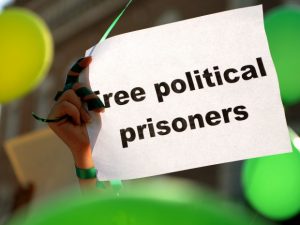Source: news.nationalpost.com
July 16, 2015 6:37 PM ET
I own and operate a business in Toronto. Since coming to Canada, I have been welcomed by other Canadians, and feel very much a Canadian now, too. I work hard and contribute as best I can to the well-being, prosperity and peace of a country that has given me a genuine home. Yet, after many years, I still love Iran and long to return some day, if only to visit but perhaps also with a dream of contributing to the mutual interests of my two homes, Iran and Canada. Both would benefit if there was greater communication, travel and more economic partnerships between the two.
Sadly, that day seems still very far off.
Imprisonment of journalists, reformers, members of minorities, students and activists continues. Several close relatives of mine in Iran are currently in prison and others face daily persecution. They are members of the Baha’i minority, Iran’s largest non-Muslim religion. They are like so many in Iran enduring human rights violations that have worsened since the election of President Rouhani, not improved.
Related
My 80-year-old uncle, Jamalodinn Khanjani, is currently serving one of the longest sentences given any prisoner of conscience. The Khanjani family farm east of Tehran has been destroyed by government officials, just as his brick manufacturing plant was in the 1980s. In a country that desperately needs more economic production, including in the agricultural sector, his farm house, the large reservoir that provided water for crops, a large fruit orchard, and his livestock, have all been destroyed. Why? Because of our family’s Baha’i religious beliefs that include the importance of the equality of women and men, the necessity of education and study of science and the arts, and the fundamental Baha’i belief in the oneness of the human family. Uncle Jamalodinn believes that no prejudice is acceptable against anyone of whatever country or religious, racial or social background, but somehow those ideals are deeply upsetting to the Iranian regime.
Baha’is are targeted, deemed unfit to attend university, hold public sector jobs, or teach school. In the past year, the government media has multiplied its hateful and false propaganda against Baha’is. Their intention is clear, to then be able to blame the public for attacks on Baha’is which the government itself has incited.
International attention during the 1980s did seem to moderate and eventually stop the execution of Baha’is, but the regime has, over the past two decades, adopted measures against Baha’is that aim to “fly below the radar” of international attention, while still doing as much as possible to suffocate the life of the Baha’i community.

I, and my cousin, Nika Khanjani, a film-maker living in Montreal, along with several thousand Iranian Baha’is, have been welcomed to Canada as refugees and immigrants since the 1979 Revolution – welcomed by sound government policy and practices, and by the smiles and assistance of Canadians generally, not to mention the deep friendship and love of several thousand Canadian Baha’is and their communities across this country.
Despite our good fortune in becoming Canadians, we continue to ask, “When will it end, this unrelenting and unjust persecution of our community that could contribute so much to Iran, helping to advance the economy, the educational life of the nation, and participate in the advance of Iranian society and culture? When will this cruel and inhuman persecution stop?”
Ever since the early 1980s, Canadian governments, both Liberal and Conservative, have been among the world’s leading countries bringing the plight of Baha’is to the attention of the United Nations human rights system, the General Assembly and the Human Rights Council, working in partnership with other nations to sponsor and vote for resolution after resolution condemning Iran for its human rights record. What more can be done?

Leave a Reply